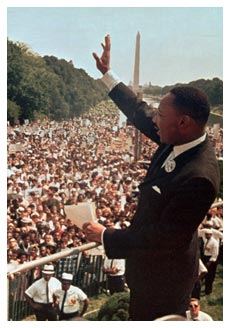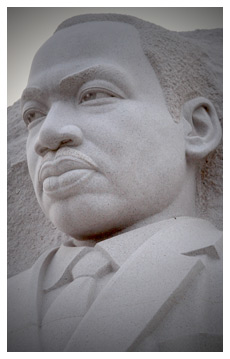
Civil rights leader Dr. Martin Luther King, Jr., is pictured in an undated portrait. Location unknown. (AP Photo)

The Rev. Martin Luther King Jr. acknowledges the crowd at the Lincoln Memorial for his "I Have a Dream" speech during the March on Washington, D.C., Aug. 28, 1963 (AP Photo)

The Martin Luther King, Jr. National Memorial in Washington, D.C. Photo courtesy of Peggy Wells, Legislative Assistant to Senator Charles Colgan.
The Dr. Martin Luther King, Jr. Memorial Commission, a statutory and bipartisan agency of the Virginia General Assembly, was created in 1992 to honor the memory and legacy of Dr. King, and to continue his work through educational, historical and cultural programs, public policy analysis, and public discourse on contemporary issues. For many years, the Commission has been at the forefront in leading the Commonwealth in appropriate activities that are indicative of the depth of Dr. King's intellect and the breadth of his passion and commitment to democracy, education, history, economic justice and security, fiscal responsibility, public and community service, sound public policy, faith and fundamental values, jobs, housing, public safety, health care, international relations, science and technology, human dignity for all persons, full participatory citizenship, and the marketplace of ideas.
Dr. King was much more than a civil rights leader. Among his many interests and gifts, he was also a passionate advocate of education and life-long learning and an avid student of history who urged his fellow citizens to appreciate and gain a thorough understanding of history to avoid repeating it. He once said, "We are not makers of history. We are made by history, and that many of the ugly pages of American history have been obscured and forgotten . . . America owes a debt of justice which it has only begun to pay."
View the Policies for Collaborations and Partnerships (pdf) »
Federal legislation was signed by President Ronald Reagan on November 3, 1983, to establish the third Monday of every January as the Martin Luther King, Jr. National Holiday. On August 27, 1984, he signed into law legislation providing for the Martin Luther King, Jr. Federal Holiday Commission. The first national King Holiday was observed on January 20, 1986, and by January 16, 1989, approximately 44 states had established a state holiday to honor Dr. King. In the years immediately following the establishment of the federal King Holiday, the Commonwealth of Virginia was among the first states to establish state legislative or executive level commissions, in accordance with the federal law, to implement the objectives of the federal law at the state level.
In 1992, the late Delegate William P. Robinson, Jr., who became the Commission's first chairman, introduced and the Virginia General Assembly enacted House Bill 997 to create the Dr. Martin Luther King, Jr. Memorial Commission as a legislative study commission. In 1997, House Bill 2198 (Robinson), was enacted to elevate the Commission to permanent legislative commission status under the authority of the General Assembly. Over the years, the Commission's charge has been broadened significantly to more adequately reflect the scope of its responsibilities.
In 1992, with the enactment of House Bill 997, the Virginia General Assembly established the Dr. Martin Luther King, Jr. Memorial Commission ("Commission") and directed it, among other things, to create a statewide memorial to Dr. King. Former Attorney General Mark E. Early, Vice Chairman, and former Delegate Jay DeBoer, Commission member, proposed that the Commission recommend and develop a living history and public policy center ("think tank") to memorialize Dr. King's legacy and continue his work. Focused on this mission, and to satisfy the statutory mandate, planning for the Center began in 1994.
6. Establish a memorial to honor Dr. Martin Luther King, Jr., in which (i) records, oral histories, and memorabilia documenting his relationship with and impact on the Commonwealth may be acquired and preserved; (ii) information concerning his life, work, teachings, writings, and philosophy may be collected, preserved, and accessed for educational and cultural purposes; and (iii) scholarly inquiry and writing, undergraduate and graduate study, and policy analysis may be conducted; (subdivision 6 of § 30-192.4 Code of Virginia)
To comply with the statutory mandate, in 2001 the Commission issued a request for proposals (RFP) for the development of the Center to all accredited public and private four-year institutions of higher education in Virginia. After reviewing the proposals, site visits to the institutions were conducted. Realizing that each of the responding institutions possessed unique and valuable expertise and characteristics, the Commission developed a consortium of nine public and private institutions of higher education, and established the Center as a virtual center to ensure the availability and access of the Center's programs, resources, and activities to students, teachers, scholars, policy makers, and citizens throughout the Commonwealth and the nation.
The initial institutions which composed the Center are Eastern Virginia Medical School, Hampton University, James Madison University, Norfolk State University, Old Dominion University, University of Virginia, Virginia Commonwealth University, Virginia Polytechnic Institute and State University, and Virginia State University. Virginia Commonwealth University serves as the designated home site and coordinator of the Center for administrative purposes.
The collective assets of these institutions in areas relevant to the legacy of Dr. Martin Luther King, Jr. equal or exceed those of any other state. The merger of the strengths and unique characteristics of these institutions under a single structure provide the capabilities needed for a national public policy center. This configuration also provides the substructure to coalesce and maximize Virginia's efforts in scholarly research and fund development, and the complementary expertise of the institutions facilitates the accessibility of Center programs and resources to all Virginians, and the effective and efficient performance of the Center's activities.
Pursuant to Senate Bill 827, the 2003 Virginia General Assembly created the Martin Luther King, Jr. Living History and Public Policy Center as a component of the Dr. Martin Luther King, Jr. Memorial Commission. This legislation also established the Center's Board of Trustees and required that the Center be operated solely with nonstate funds. The Board of Trustees held its organizational meeting in August 2003. The Center was incorporated as a nonstock corporation in Virginia in October 2003.
In 2004, the General Assembly amended the enabling statute to distinguish and clarify the powers and duties of the Board and the Commission, and among other things, to extend to the Board the corporate powers given to corporations by Title 13.1 of the Code of Virginia. In addition, other legislation enacted allowed individuals entitled to a Virginia state income tax refund to contribute a portion or all of the refund to the Dr. Martin Luther King, Jr. Commission Fund to support the work of the Center.
The Center received its federal tax exemption in February 2005. The statute was amended again in 2005 (§ 2.2-2725, Code of Virginia) to establish the Center as an independent, nonprofit corporation exempt from taxation pursuant to § 501 (c)(3) of the Internal Revenue Code. A two-year transition period until July 1, 2007, was granted by the Internal Revenue Service to facilitate the orderly transfer of the General Assembly's duties and responsibilities for the Board and the Center to the Board of Trustees, and to allow the Board time to employ staff and the Center to become acclimated to functioning apart from the Commonwealth as an independent nonstock corporation.
In the 2006, the General Assembly conformed the governing structure of the Martin Luther King, Jr. Living History and Public Policy Center to federal law governing nonprofit organizations and § 501 (c)(3) of the Regulations of the Internal Revenue Code, and federal and state laws governing tax exempt organizations.
The Martin Luther King, Jr. Living history and Public Policy Center, a nonprofit organization, independent of the King Commission, is a virtual center and consortium of public and private institutions of higher education in Virginia administered and based at Virginia Commonwealth University.